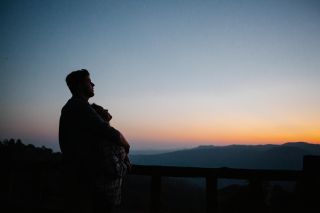Awe
The Power of Sharing Moments of Awe
How do shared experiences of awe and wonder affect us?
Posted May 17, 2024 Reviewed by Davia Sills
Key points
- Experiences of awe shift one's focus outward instead of inward to think beyond self-referencing thoughts.
- States of awe can unlock people's perception of themselves and others from their biased narratives.
- Awe allows people to see beyond their expectations and “predictive coding” to the reality in front of them.

Consider what millions of Americans in the path of totality for the April 2024 solar eclipse exclaimed as the sky darkened: “Oh, wow—I’ve never seen anything like this!” Their awe generated deep emotions, tears of gratitude, chills of excitement, reverence, a sense of oneness with others, being part of something greater than ourselves, an affirmation of life. For such a brief and fleeting event, the eclipse had an enormous impact. These breathtaking minutes were shared with others on top of mountains, in open fields, on ocean beaches, as well as through TikTok, YouTube, and much more.
As I watched the TikTok and YouTube videos, vicariously enjoying the amazement that “eclipse totality” viewers were experiencing, I marveled at the truth that most of us yearn for awe and wonder. Indeed, we are willing to go to great lengths to find it—especially when we can share it with millions, thousands, small groups, or even one dear friend.
Many of us have recently enjoyed awe-inspiring experiences with others:
- 40,000 Swifties singing in unison at an Eras Tour concert, or another 30,000 revelers gasping in awe at the light show of Coldplay’s concert hit, “A Sky Full of Stars”
- Staying up late to watch the solar extravaganza of the Aurora Borealis
Or we’ve enjoyed more intimate experiences of awe and wonder:
- Sitting around a campfire sharing amazing stories that give us goosebumps
- Walking with our partner or friend through a forest for the first time
- Being a teacher who brings the “awe-factor” to a classroom by showing videos of caterpillars turning into butterflies
- Chatting with a good friend on the porch and suddenly being visited by a cardinal that comes amazingly close to you
- Gathering to hear personal stories of spiritual or wondrous encounters with dreams, near-death experiences, or signs of contact from deceased loved ones
- Saying a prayer or blessing in unison with trusted friends at a candlelit vigil
These wondrous encounters take on a whole new meaning and significance when they are shared—whether with one person, a few friends, or with multitudes. And at difficult times in our lives, our loneliness, grief, and trauma can be eased by shared moments of awe and wonder. A long sunset walk with a friend in wonder and silence can be comforting for someone grieving the death of a loved one, for instance.
What can neuroscience research tell us about these awe-inspiring experiences, particularly when these moments are shared live and in person?
In a BBC article by David Robson, University of Michigan psychologist Ethan Kross describes awe as “the wonder we feel when we encounter something powerful that we can’t easily explain.” Awe and wonder leave us speechless and stunned for a moment, a pause—an instant change that resets our thought patterns. Kross adds, “When you are in the presence of something vast and indescribable, you feel smaller, and so does your negative chatter.” Kross has conducted studies with PTSD survivors, including military veterans and youth from underserved communities. One study where participants joined in a rafting trip in Utah demonstrated how their feelings of awe predicted better outcomes in their well-being months later: “The capacity to step outside of ourselves is a really valuable skill.”
Awe shifts our energy and focus outward instead of inward. In a moment of marveling at something beyond ourselves—a sunset, a song, a heron—our attention goes outward, quieting our self-talk, especially our negative self-talk or rumination. When we are sharing a moment of awe with others, this pause of amazement allows us to break free from our nagging thoughts and attune to those around us.
Awe unlocks our perception of ourselves and others from our biased narratives, at least for a moment. Indeed, our brain is always struggling to predict what will happen next. Social psychologist Michelle Shiota, a researcher at Arizona State University, describes this tendency to presume what is coming next as “predictive coding.” But in a breathtaking state of awe and wonder, Shiota observes, “The mind dials back its ‘predictive coding’ to just look around and gather information.”
So, awe literally puts reality right in front of us. Our minds practically gasp when we’re overcome with awe—we “get it” on some level, even if we cannot explain it. When we are experiencing moments of awe with others, we welcome these powerful, inexplicable experiences that snap us out of our habitual mindsets and expectations.
In these fleeting, yet powerful experiences, we infuse ourselves with each other’s awe as well as the source of that awe. A shared wondrous encounter is a contagious, amazing, life-changing phenomenon, and we never forget how we felt at that moment—so connected, unified, part of something greater than ourselves.
Neuroscience has shown us how these humbling moments of awe allow us to see ourselves in a whole new light. Awe is considered to be a self-transcending emotion—a state of mind that stretches our awareness beyond our habitual patterns of thinking. Essentially, awe grabs our attention away from our self-referential thoughts and pulls us out of our self-absorption.
Psychologists such as Dacher Keltner have called our sense of self within this expanded, vast perspective our “small self,” an awareness of being a small part of a much wider world beyond our own lives. This vast, all-inclusive sense of oneness helps us feel humility and compassion for others around us. In his bestseller, Awe: The New Science of Everyday Wonder and How It Can Change Your Life, Keltner defines awe as “the feeling of being in the presence of something vast that transcends your current understanding of the world.” It’s no surprise that we are far more receptive to each other in open states of awe and wonder.
Psychologist Jennifer Stellar of the University of Toronto has found that experiences of awe give us a sense of purpose and a desire to help others. She and fellow researchers, including Michelle Shiota, have concurred that there are pro-social benefits to cultivating awe and wonder in our daily lives. Shiota attests, “When I am less focused on myself, on my own goals and needs and thoughts in my head, I have more bandwidth to notice you and what you may be experiencing.”
Echoing Shiota’s words, having “more bandwidth to notice” is the perspective that awe gives us—a more powerful way of seeing, feeling, and being in and of that moment. It opens us to life around us and takes our minds off of ourselves.
In our drive to experience awe and wonder, such as seeking to encounter a solar eclipse, we’re hardwired to join in these unifying, selfless, vast experiences. When we’re dazzled or captivated by something greater than ourselves at the same moment, we see each other in a new light.
In her wonder-filled poem “The Ponds,” Mary Oliver proclaims, “Still, what I want in my life is to be willing to be dazzled.”
Our willingness to be dazzled together—watching an Aurora Borealis, marveling at a cardinal, or singing at the top of our lungs at a packed stadium of 40,000 ecstatic fans—proves that we haven’t yet given up on humanity (despite the pessimism and cynicism around us). In short, awe and wonder restore our faith in ourselves and others.
Here are a few suggestions for experiencing awe and wonder with others:
- Share your own stories of awe and wonder as a group (a storytelling session).
- Watch the Webb Space Telescope on a big screen with others.
- Share Louie Schwartzberg’s Hidden Miracles of the Natural World or other awe-inducing videos, such as Yosemite HD II.
- Read wondrous poetry out loud (e.g., Mary Oliver or William Wordsworth).
- Take walks with a companion.
- Enjoy exploring, birding, hiking, kayaking, and wading.
- Share stories of heroes or amazing acts of love, kindness, or courage.
- Attend a live concert.
- Quietly watch a sunrise or sunset with a loved one.
- Go sailing with a few companions.
- Lie on the ground and gaze at stars and constellations.




